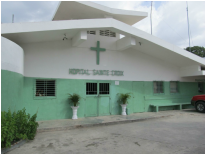James Bruzzi

On Monday night in Haiti, sitting in the common room of the Hopital St. Croix guesthouse, a woman's heartbroken scream echoes from the pediatric ward downstairs. Kelle and I glance at each other with a concerned look.
Moments later, the doorbell of the guesthouse rings. Looking through the peephole in the door I see one of the hospital doctors. I open the door for this doctor, a middle aged gentleman who walks with the assistance of a forearm crutch. I look into his sad eyes as he tells me that a baby in the hospital has just died.
Sensing his pain, Kelle and I follow him into the kitchen; and we each open a Prestige beer and gather around him. He tells us that the baby died of meningitis; and that as is a common cultural practice in Haiti, the mother attempted to treat the baby with folk medicine and religion before bringing the baby to the hospital. Despite the heroic efforts of the hospital staff, it was too late to save the baby.
As the mother's tortured screams continue outside, he introduces himself as Doctor Alex. He tells us of his efforts to educate the public of the importance of going to the hospital for treatment as soon as possible through the hospital radio station. He tells us of the challenges of being a doctor in Haiti and the importance of treating patients with a human perspective rather than a purely scientific one. He feels the pain of the patients, and that is evident by the sorrow he carries with him.
He tells us of the funding issues for the hospital and that there is very little provided by the government, with healthcare making up only five to seven percent of the national budget in a country where the average person lives off less than two dollars per day. While the hospital would like to offer free services, it must charge minimal fees in order to continue operating. Doctor Alex often pays for patients' medications out of his own meager salary when they cannot afford it.
He tells us that while he barely scrapes by, that he is happy to help anyone he can. He tells us that money is not important and that what brings true peace and happiness is helping others in any way possible. He repeats to us that what you give and what you share comes back to you in your heart. He tells us of the many times that his good deeds have returned to him, from avoiding fatal car accidents to leaving a building moments before the earthquake collapsed it on top of where he had been sitting minutes earlier.
Wiping tears from our eyes, we look at this beautiful, selfless man as his wise words resonate in our hearts and souls. His truth is a profound blessing. We bid Doctor Alex good night with the hopes that his good works continue to come back to him and that his palpable peace and love remain strong.
Moments later, the doorbell of the guesthouse rings. Looking through the peephole in the door I see one of the hospital doctors. I open the door for this doctor, a middle aged gentleman who walks with the assistance of a forearm crutch. I look into his sad eyes as he tells me that a baby in the hospital has just died.
Sensing his pain, Kelle and I follow him into the kitchen; and we each open a Prestige beer and gather around him. He tells us that the baby died of meningitis; and that as is a common cultural practice in Haiti, the mother attempted to treat the baby with folk medicine and religion before bringing the baby to the hospital. Despite the heroic efforts of the hospital staff, it was too late to save the baby.
As the mother's tortured screams continue outside, he introduces himself as Doctor Alex. He tells us of his efforts to educate the public of the importance of going to the hospital for treatment as soon as possible through the hospital radio station. He tells us of the challenges of being a doctor in Haiti and the importance of treating patients with a human perspective rather than a purely scientific one. He feels the pain of the patients, and that is evident by the sorrow he carries with him.
He tells us of the funding issues for the hospital and that there is very little provided by the government, with healthcare making up only five to seven percent of the national budget in a country where the average person lives off less than two dollars per day. While the hospital would like to offer free services, it must charge minimal fees in order to continue operating. Doctor Alex often pays for patients' medications out of his own meager salary when they cannot afford it.
He tells us that while he barely scrapes by, that he is happy to help anyone he can. He tells us that money is not important and that what brings true peace and happiness is helping others in any way possible. He repeats to us that what you give and what you share comes back to you in your heart. He tells us of the many times that his good deeds have returned to him, from avoiding fatal car accidents to leaving a building moments before the earthquake collapsed it on top of where he had been sitting minutes earlier.
Wiping tears from our eyes, we look at this beautiful, selfless man as his wise words resonate in our hearts and souls. His truth is a profound blessing. We bid Doctor Alex good night with the hopes that his good works continue to come back to him and that his palpable peace and love remain strong.

 RSS Feed
RSS Feed